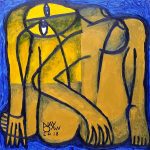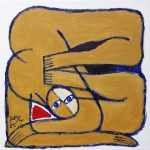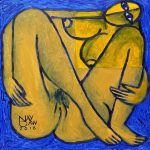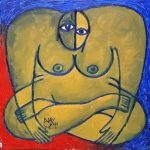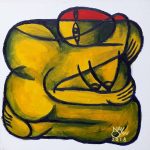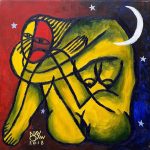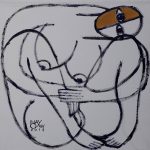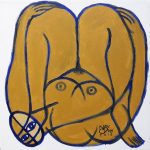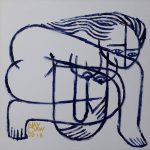The Irrawaddy Magazine |
- Writer-Turned-Painter Turns His Attention to the Human Form
- NLD Used RCSS Leader’s Face on Campaign Material Without Permission, Group Says
- Commander-in-Chief Praises Pro-Military Rallies Denouncing Int’l Pressure
- Myanmar, Thailand to Jointly Upgrade Highway from Border to Dawei SEZ
- Baby Dies While Family Flees Fighting in Shan State, Father Says
- Shan Armed Group Reconsiders Participation in Ceasefire Monitoring Body
- Analysis: NLD Faces Crucial Test of Support in By-Election
- For New Album, Punk Band No U Turn Grows Up
- Buthidaung Police Seize Nearly 1 Million Ya Ba Pills from River Vessel
- Chin Refugee Committee Urges UNHCR to Shelve Repatriation Plan
- Prisons Are Not for Journalists, Farmers and Activists
- Prominent Vietnamese Academic Under Fire for Criticism of One-Party Rule
- The Cambodian Textile Factory that Craves ‘Normal’
- Pilot Radioed Alert on Doomed Indonesian Jet’s Previous Flight
- Bangladesh PM to Have Unprecedented Talks with Opposition Before Poll
| Writer-Turned-Painter Turns His Attention to the Human Form Posted: 02 Nov 2018 08:05 AM PDT YANGON—More than 30 years after he fell in love with the nude paintings of Italian artist Amedeo Modigliani, Nay Myo has finally realized his dream of holding his own exhibition of nudes. "Dirty," an ongoing exhibition at the Ahla Thit Gallery on University Avenue Road in Yangon, showcases the fruits of that dream. "I have wanted to draw nude paintings like [Modigliani] since I was an art student in 1982," Nay Myo said. "I knew I would draw them someday. So, I have finally realized this dream," he said. His nude figures are largely square-shaped with a focus on lines. Yellows and blues are dominant in his paintings, which feature short, "chopping" brushstrokes. His command of texture and tone strengthens the feeling in the paintings. In Myanmar, nude paintings were censored until 2012, and nudity is still largely taboo in Myanmar society, though more and more people are accepting it as a legitimate subject for artists. Paintings of nude subjects by artists including Kyi Myint Saw, Sandar Khaing and Myint Naing have gained an audience among art fans of late. The nude paintings of Nay Myo are distinct from their works in terms of composition and figurative expression, however. The way he renders the hair and facial expressions of the nude women in his paintings is reminiscent of modernist Win Pe. "We respect him a lot. Of course he has an influence on us," Nay Myo said. His fourth solo exhibition, which runs through Wednesday, includes 20 paintings, which can be purchased for USD300 each. Born in Mandalay, Nay Myo graduated from the city's State School of Fine Arts in 1983. He made his name with modernist portrayals of rural scenes and Myanmar customs. He is also a renowned writer of short stories, poems and essays. "Frankly, I just seek to reveal the dark emotions that stain our daily lives," Nay Myo said about his nude paintings. The post Writer-Turned-Painter Turns His Attention to the Human Form appeared first on The Irrawaddy. |
| NLD Used RCSS Leader’s Face on Campaign Material Without Permission, Group Says Posted: 02 Nov 2018 07:42 AM PDT MANDALAY—Campaign pamphlets appearing to suggest that the Restoration Council of Shan State (RCSS) endorses the National League for Democracy (NLD)'s by-election candidate in Laihka Township were distributed without the ethnic group's knowledge, it said in a statement on Thursday. The pamphlets supporting NLD candidate Sai Htun Aung Lay's election bid in Laihka The RCSS said in a statement issued on Thursday that it has no relationship with the NLD or involvement in the by-election. "The pamphlets with the photo of our chief could lead to a misunderstanding or could put pressures on voters. We do not want to see such a situation, so we issued this announcement to assure voters that the RCSS has nothing to do with the by-election and has no business with the NLD's by-election campaigns," Lieutenant-Colonel Sai Oo, a spokesperson for the RCSS, told The Irrawaddy on Friday. NLD candidate Sai Htun Aung Lay is competing against representatives of ethnic Shan parties for a seat in the Lower House for Laihka constituency. He will vie for the seat against Sai Shwe Seing of the Shan Nationalities Democratic Party (SNDP) and Sai Okkar of the Shan Nationalities League for Democracy (SNLD) party on Nov. 3. "The SNLD and SNDP are also contesting the seat, but they did not distribute such propaganda. We are afraid the voters will be confused and misinterpret the campaign pamphlets of the NLD and misunderstand the [position of the] RCSS," Lt-Col. Sai Oo said. "Moreover, the RCSS has a good relationship with all political parties, not only with the NLD. We do not want political parties to use us as a propaganda tool for the by-election, which could create misunderstandings. That's why we made this announcement," he added. In Shan State, the SNLD and SNDP receive more support from locals than does the NLD; the same is true of ethnic parties in other ethnic areas such as Chin, Rakhine and Kachin states. An NLD spokesperson told The Irrawaddy that the use of the photos of the RCSS chief and the state counselor had no special intention other than to show solidarity with ethnic people. "It is just to show that our party has a strong relationship with the ethnic people, and also works for ethnic people. During the by-election campaign, some have criticized the NLD as a Burmese party which has no interest in ethnic matters," explained the spokesman, U Myo Nyunt. "We have no intention other than to show our solidarity with the ethnic people," he said. The post NLD Used RCSS Leader's Face on Campaign Material Without Permission, Group Says appeared first on The Irrawaddy. |
| Commander-in-Chief Praises Pro-Military Rallies Denouncing Int’l Pressure Posted: 02 Nov 2018 06:14 AM PDT YANGON — Myanmar’s commander-in-chief this week praised pro-military rallies that have denounced international calls for him and other top generals to be held accountable for the alleged human rights violations against Rohingya and said the events should be repeated. Myanmar’s military, or Tatmadaw, has come under mounting international pressure in the wake of operations in northern Rakhine State — triggered by militant attacks on security posts — that have driven some 700,000 mostly Rohingya to neighboring Bangladesh. In September, the UN Human Rights Council voted to set up a body to prepare evidence for possible future prosecution at the International Criminal Court. Since then, army sympathizers — including ultranationalists, war veterans and their families — have organized more rallies across the country to express support for the military’s actions in Rakhine State and for “protecting sovereignty, race and religion.” At a rally last month led by ultranationalist monk U Wirathu, at least 1,000 people gathered in downtown Yangon to condemn what they called international interference in Myanmar and its military. During a special conference of the Myanmar War Veterans Organization on Wednesday in Naypyitaw, military chief Senior General Min Aung Hlaing told the audience that “nationalistic and patriotic people in various townships have organized rallies to show their opposition to one-sided allegations and interference by some foreign countries and organizations in the internal affairs of our country, and to show support for the actions of the Tatmadaw.” He added that those who joined the rallies understood the military’s goodwill toward the Union and its people, and that the military and the people were on the same side, according to military-run newspaper Myawaddy. "Such good traditions should be maintained," the commander-in-chief said. It was the first time Snr. Gen. Min Aung Hlaing has spoken publicly about the pro-military rallies. According to Myawaddy, such rallies have been held across the country since 2016. After October’s rally in Yangon, the paper said: “As of yesterday, 80 rallies have been carried out and joined by more than 600,000 people. There are more in the pipeline." The post Commander-in-Chief Praises Pro-Military Rallies Denouncing Int’l Pressure appeared first on The Irrawaddy. |
| Myanmar, Thailand to Jointly Upgrade Highway from Border to Dawei SEZ Posted: 02 Nov 2018 05:33 AM PDT YANGON—Myanmar and Thailand signed an agreement to jointly upgrade a highway linking the Thai-Myanmar border with the Dawei Special Economic Zone (SEZ), a USD8 billion project that includes a deep seaport. The project in southern Myanmar's Tanintharyi Region is set to be Southeast Asia's largest industrial complex. Under the Record of Discussion (ROD) agreement inked on Thursday, the Ministry of Construction will allow Thailand's Neighboring Countries Economic Development Cooperation Agency (NEDA) to conduct survey and design work in preparation for upgrading the two-lane highway. The route will connect the border crossing point at Htee Kee to the SEZ via Myittar. Construction Minister U Han Zaw said Thailand would provide technical assistance on the survey and design of the highway. The project will take about eight months to complete. U Han Zaw said he expects the highway project to boost economic development in Tanintharyi Region, in particular by allowing direct exports of fishery products to Thailand and by promoting travel between the two countries. Fishing is one of the major industries on the Tanintharyi coast, with most of the seafood products being exported to Thailand. NEDA will accelerate the survey and design period so that the highway upgrade can get going as soon as possible, said its president, Perames Vudthitornetiraks. In March, the Union Parliament gave the Ministry of Construction permission to take a 4.5-billion-baht (approximately USD137 million, or 220.5 billion kyats) low-interest loan from NEDA. The ministry has been working with Thailand's Department of Highways since 2015 on conducting measurements for the highway. Vice Construction Minister U Kyaw Lynn said in Parliament in March that the highway upgrade would assist in the transportation of raw materials needed to complete the Dawei SEZ construction project. In 2008, Myanmar granted Italian-Thai Development PCL (ITD) a 75-year concession to develop and attract investment for the SEZ. A 250-sq-km deep seaport would be a potential boon for firms relying on the transport of goods via the crowded Malacca Strait. The project includes high-tech industrial zones, information technology zones, export-processing zones, port area zones, transportation zones, service business zones and other infrastructure projects. ITD withdrew from the agreement in 2013 due to financial constraints, but two years later Myanmar and Thailand revived the original agreement to allow ITD and related companies to begin working on the infrastructure project. According to Dawei SEZ Management Committee chairman U Tun Naing, Japan International Cooperation Agency (JICA) is conducting a survey for the deep seaport project, including setting up an electrical grid, basic infrastructure and buildings. The post Myanmar, Thailand to Jointly Upgrade Highway from Border to Dawei SEZ appeared first on The Irrawaddy. |
| Baby Dies While Family Flees Fighting in Shan State, Father Says Posted: 02 Nov 2018 05:12 AM PDT Mon State — A 19-day-old baby died after falling sick on Tuesday in northern Shan State when the family was forced to flee their home to escape fighting in the area among a trio of ethnic armed groups, according to the parents. The father, Tu Mai, told The Irrawaddy that his wife gave birth to twins on Oct. 11 in Mang Bein Village and that they took them to the town of Lashio, about 13 km away, after they fell sick to get them treated. He said they stayed in Lashio for 10 days and that a day after they returned to their village the fighting broke out, forcing them to hide in the jungle for about two hours in the rain without food or clothes for the babies, at which time one of the girls fell ill again. Tu Mai said they made it to the village of Aee Nang, about 3 km away, by midnight but three days later had to flee again with others to Lashio when the fighting escalated. But the baby died once they arrived and they held her funeral the same day. The father said the other baby was in good health. However, he said the camp was short of food and that health workers have advised his wife to go to a hospital but that they did not have enough money to get her treatment. Tu Mai said he had no words to express how sad he felt after having to flee his home and losing a baby. Fighting in the area broke out on Oct. 26 pitting the Ta’ang National Liberation Army and the armed wing of the Shan State Progress Party against the armed wing of the Restoration Council of Shan State. More than 1,000 people have been displaced from several villages and are taking shelter at churches and monasteries in Lashio. The post Baby Dies While Family Flees Fighting in Shan State, Father Says appeared first on The Irrawaddy. |
| Shan Armed Group Reconsiders Participation in Ceasefire Monitoring Body Posted: 02 Nov 2018 03:58 AM PDT CHIANG MAI, Thailand — The Restoration Council of Shan State (RCSS) said it would stop participating in every level of Joint Ceasefire Monitoring Committee discussions at least until the armed group’s senior leaders meet next week, claiming the committee was not abiding by the Nationwide Ceasefire Agreement (NCA). The RCSS has already skipped two meetings of the committee since announcing on Oct. 7 that it was assessing the body’s alleged problems and considering ways to fix them. On Thursday it said its senior leaders would discuss whether to keep participating when they meet in the second week of November. RCSS spokesman Lieutenant Colonel Sai Meng told The Irrawaddy that it would only be possible to continue with peace negotiations when the government and military “reconsider their agendas for the NCA.” He cited the military’s insistence at a recent three-way peace summit that armed groups disavow secession and endorse a single national army as some of the key hurdles. The RCSS says the military is failing to live up to not only the NCA, but to a bilateral ceasefire and code of conduct it signed with the group as well. "So we want to change the [committee’s] standard operating procedures and the intervention from outside experts," said Lt. Col. Sai Meng, noting that the participation of independent experts was currently very weak. Since the NCA was signed in 2015, the Joint Ceasefire Monitoring Committee has been charged with mediating disputes among the signatories. The RCSS and military have lodged multiple complaints against one another, the later mostly accusing the former of extortion and forced recruitment. Lt. Col. Sai Meng said much of the NCA has yet to be implemented in part because the signatories keep accusing each other of violating the agreement. He said the RCSS has released the soldiers it has detained over the years while RCSS members the military has arrested — he claims they were all unarmed — have been put on trial (The RCSS’s code of conduct with the military says its members may travel unmolested so long as they are not armed). "We think our members who travel without weapons should not face such detention and charges," Lt. Col Sai Meng said. The RCSS says it has asked the military to release its members many times, to no avail. It has also asked the military to release some civilians it arrested in August 2017 and charged for possessing walkie-talkies and rudimentary weapons, also without success. The RCSS’s latest move is but the latest setback for the national peace process. Last week the Karen National Union (KNU) said it was temporarily suspending participation in peace negotiations in order to consult with its members on whether to continue taking part. As a result of the RCSS and KNU decisions, next week’s meeting of the armed groups’ Peace Process Steering Team — chaired and co-chaired by the KNU and RCSS, respectively — has been postponed.
The post Shan Armed Group Reconsiders Participation in Ceasefire Monitoring Body appeared first on The Irrawaddy. |
| Analysis: NLD Faces Crucial Test of Support in By-Election Posted: 02 Nov 2018 03:41 AM PDT YANGON—On the eve of the second by-election to be held during its first term in office, the ruling National League for Democracy (NLD) admitted to being concerned about Saturday's crucial test of its support nationwide. NLD spokesperson Dr. Myo Nyunt told The Irrawaddy the party was taking Saturday's poll even more seriously than the 2017 by-elections, given the public criticism it has received since then, especially over the slow pace of economic reforms in recent years. "We do worry that the voters will feel that the party has failed to implement the election promises [it made in the 2015 general elections]," he said. He said the government has focused on health and education, and made some progress in those sectors. On the economic front, he said, it is implementing a long-term vision, rather than chasing short-term goals. Aware that its public support may be sliding, the government has made an effort to highlight its works and policies on the campaign trail ahead of Saturday's vote, the spokesperson said. A total of 69 candidates from 24 political parties are running for seats in Chin, Shan, Kachin and Rakhine states and in Yangon, Sagaing, Bago, Magwe and Mandalay regions. Seven of the candidates are running as independents. Four Lower House seats, one Upper House seat, seven seats in state and regional parliaments and the Shan ethnic affairs minister's seat in Mandalay Region are up for grabs in the by-elections. The vacant seats are in Lechar in Shan State, Rathedaung in Rakhine State, Myitkyina in Kachin State, Kanpetlet and Matupi in Chin State, Tamwe and Seikkan in Yangon Region, Tamu in Sagaing Region, Myingyan and Thabeikkyin in Mandalay Region, Oktwin in Bago Region and Minbu in Magwe Region. The NLD is running in all 13 constituencies, followed by the military-backed former ruling Union Solidarity and Development Party (USDP), which is contesting 10 seats. While it is still the country's most popular political party, the NLD can no longer take for granted the overwhelming public support it received in the 1990 general election, 2012 by-election and 2015 general election. The NLD swept to power in a landslide victory in 2015, taking more than 80 percent of all seats not reserved for the military in Parliament. More than two years after taking power and almost halfway through its term, however, the NLD-led government has come under growing criticism of its lack of progress on economic reforms, backsliding on freedom of expression and generally falling short on its election promises, though it has received praise for its stepped-up fight against corruption. In the most visible sign of this decreased support, the party won just nine of 19 vacant seats—only 50 percent of those it contested—in the 2017 by-elections. The result was a sharp contrast to its general election victory just two years prior. And while it still came out on top nationwide with nine seats won, the party lost in three of the four ethnic areas it contested, including in areas it won in 2015. The results point to the NLD's waning popularity in ethnic states, something political analysts attribute to its failure to deliver on its main election promises: to end the civil wars in ethnic regions and to amend the undemocratic military-drafted 2008 Constitution.  Political analyst Dr. Yan Myo Thein said that while the NLD is still favored to win in constituencies with Burman majorities, it faces likely defeat in the strongholds of ethnic parties—and could even have a tough fight on its hands in some other areas as well. Of the 13 seats up for grabs in the by-election, the NLD won 11 in 2015. (The exceptions are Lechar in southern Shan State and Rathedaung in Rakhine State.) Mandalay chief minister Dr. Zaw Myint Maung, who is also the NLD's vice chairman, said the party is not confident of winning in Rakhine and Shan. On a more positive note, he said that after some initial difficulties the party had gained ground in Chin and Karen states, as its Central Executive Committee had made a point of campaigning in the local languages in order to improve communication with potential voters in those constituencies. Party spokesperson Dr. Myo Nyunt agreed that the competition in ethnic areas will be fierce, as the ethnic parties have strong support there. He said the party still expects to win the majority of the seats that are up for grabs, however. While the results of the by-elections will not impact the structure of the current government, they will serve as an important indicator of political parties' popularity ahead of the 2020 general elections and a test of the NLD's support halfway through its term. USDP spokesperson U Thein Htun Oo told The Irrawaddy that the party was confident of winning all 10 of the seats it is contesting. He said that the political situation had changed since 2015, and the party was enjoying a groundswell of support. "Voters now understand that the party they believed in and chose in 2015 is not reliable. They have compared its performance with what we achieved [under the previous government]," he said, adding that the USDP expects to see greater public support at the polls in this by-election and looking ahead to 2020. The USDP campaigned on the slogan "Time to Think". It has placed national issues at the top of its agenda and vowed to prevent any "territorial loss" or "bullying from foreign countries." U Thein Htun Oo said that after winning seats in the by-election, the party would work to advance farmers' interests and the rule of law, and to increase daily wages. Dr. Yan Myo Thein, the political analyst, said the election results would send a signal to all parties as to how they should prepare for 2020. He added that the NLD would need to reconsider its policies and make corrections before 2020 if it doesn't win more than 50 percent of the seats in Saturday's by-election. NLD spokesperson Dr. Myo Nyunt vowed that the public would see satisfactory developments in the remaining two years of the government's term, adding that there will be improvements in the implementation of its long-term policies. The post Analysis: NLD Faces Crucial Test of Support in By-Election appeared first on The Irrawaddy. |
| For New Album, Punk Band No U Turn Grows Up Posted: 02 Nov 2018 02:15 AM PDT YANGON — Well known local punk rock band No U Turn released its new 12-track album, “Muu Yit Say,” or “Drug,” last month. Lead vocalist Ye Ngwe Soe considers it one of the group’s most mature-sounding releases to date. "Year by year, we've grown old. So our songs are also getting old with us. Making music also depends on feeling. So we chose lyrics that suit our age and rejected the same old boring songs, like about missing someone," said Ye Ngwe Soe, who also plays guitar. "We don’t want our ageing to go to waste," said the 32-year-old, who sports long black hair and a handlebar moustache. “Muu Yit Say” is No U Turn's fourth album, recorded in the three years since their last release, “Luu Thar Sit Pwal,” or “Human War.”  Ye Ngwe Soe wrote two of the new tracks and guitarist Eaiddhi wrote eight. Ba Nyar, from the band General Tiger Gun, and Thet Khine, from Kultureshock, wrote one apiece. "I like all the tracks on this album. My favorite memory from recording this album is that bassist Eaiddhi sang four of the songs that he wrote," Ye Ngwe Soe said. The title of the album, taken from one of the tracks, is not meant to condone or promote drugs — far from it. "That song is about the angry and sad feelings of a young man who was addicted to drugs but struggled and escaped from the drug trap," he said. "As is the nature of youth, they want to test everything, including drugs. Older people should show them the right way by teaching or rebuilding their mindsets, not by punishment — that can destroy many young lives,” the frontman said. He said sending young drug user to prison could do more hard than good because it may bring them under the influence of hardened criminals or turn them into social outcasts once they’re released.  "So my point of view is that reforming the young generation is the right way. That is the message of the song," Ye Ngwe Soe said. "We don't want to see cheap alcohol ad posters with sexy girls in public. We only want to see posters with the emergency phone number to call when someone is overdosing." "Muu Yit Say” was recorded at the Date studio, in Pyin Oo Lwin, Mandalay. The band wanted a place it could concentrate on the creative process and so set aside a few months. "Each member has his own personal problems and it's not easy to coordinate schedules…. We wanted more time together as a band. We discussed, we fought, we recorded and we had a lot of new experiences," Ye Ngwe Soe said. Around 2002, Ye Ngwe Soe started listening to rock bands like Guns N’ Roses and fell in love with the “pop punk” sound. He also learned about the scene’s style, trends and ethos from books and the internet. Thus No U Turn was born. Along with himself, Eaiddhi and Yar Zar, their new drummer, Ye Khine Oo, rounds out the quartet. "Punk music hit the world like a bomb in 1970, and pop punk hit audiences in 2000, including Myanmar. Before punk rock music, pop punk fashion had already reached Yangon," Ye Ngwe Soe said. "People did not really like punk rock music in the 1970s, 1980s and 1990s; they just tended to wear the clothes. And a few groups of people became interested in their lifestyle because we couldn’t easily get internet access around 2000. Nowadays there are a lot of punk music styles — such as classic punk, ska punk, pop punk, street punk and hardcore punk — based on punk rock. So the new punk stars should learn more about the punk lifestyle and thinking, not just the fashion."  During their nine-year journey, No U Turn has built up a devoted following including foreigners. Most of their gigs are packed with a young crowd, especially boys. "I have never identified the people who come to our concerts as my fans. All of us are living with the same music taste. Foreigners are interested in No U Turn because we sing a style of music from 1970 in 2018. If I saw someone [from abroad] singing our Burmese oldies, I would love it,” he said. Ye Ngwe Soe is also the co-founder of Jam It, an underground music concert series. "In the future No U Turn will keep making music, and the Jam It team will produce other talented musicians and help them as much as we can," he said. No U Turn will host a release party for its new album on Saturday at the Basement Bar with opening sets by Indie rock bands The Reasonabilists, Sonn Boon and The Apple-Jack. The show will start at 5 p.m. The post For New Album, Punk Band No U Turn Grows Up appeared first on The Irrawaddy. |
| Buthidaung Police Seize Nearly 1 Million Ya Ba Pills from River Vessel Posted: 02 Nov 2018 01:10 AM PDT SITTWE—Police seized 975,000 methamphetamine (or "ya ba") tablets with an estimated value of 1 billion kyats in Rakhine State's Buthidaung Township on Thursday. Acting on a tip-off, police found the "WY"-stamped tablets hidden beneath fish packed in cooler boxes on the river-going vessel Aung Kyaw Moe, which travels between Sittwe and Buthidaung. "In response to a tip-off, we searched the vessel and found tablets hidden beneath fish [packed in boxes]. The suspects are still at large," Police Major Kyaw Thu Win, commander of Buthidaung Township police force, told The Irrawaddy. "We are identifying the consignor and consignee," he added. The vessel transports passengers and cargo between Sittwe and Buthidaung, and police are currently interrogating those responsible for the consignment of the cargo. The drug haul follows the seizure of 1,400,000 "WY" tablets with an estimated value of 4.3 billion kyats on Aug. 25, and a record bust involving 2,900,000 WY tablets worth 5.7 billion kyats on Oct. 22 in Buthidaung. Rakhine State Police reported 124 drug cases from January through the second week of August this year, in which 188 suspects were arrested and "WY" tablets and marijuana with a street value of 1.28 billion kyats were seized. Most of the busts were made in Sittwe, Maungdaw and Buthidaung townships. The post Buthidaung Police Seize Nearly 1 Million Ya Ba Pills from River Vessel appeared first on The Irrawaddy. |
| Chin Refugee Committee Urges UNHCR to Shelve Repatriation Plan Posted: 02 Nov 2018 01:08 AM PDT YANGON — The Chin Refugee Support Committee (CRSC) has urged the United Nations High Commissioner for Refugees (UNHCR) to shelve its plan to repatriate Chin refugees in Malaysia to Myanmar. The UNHCR announced in June that refugee protection for the Chin community in Malaysia would be phased out starting August 2018, stating that their homeland was safe for return. Chin refugees applying for a renewal of their refugee status will only receive an extension until Dec. 31, 2019, said the UNHCR. The CRSC in a statement on Oct. 31 said the UNHCR's decision shocked the Chin refugee community in Malaysia, adding that some Chin refugees including a young girl attempted to commit suicide following the UNHCR announcement. "For their return, the [Myanmar] government should let them come back officially at the very least. It is difficult for them to come back without official repatriation," said Salai Issac Khin of the CRSC. "Some have been living in Malaysia for about seven years and they need to apply for citizenship registration cards [to return]. Another problem is education. The children have been learning at refugee camp schools. So, the question is which grades they should attend when they come back," he added. The Myanmar government should grant pardons for Chin refugees so that they are not charged under immigration laws. Moreover, there is a need to provide sources of livelihood for the returnees, he said. According to the CRSC, there are some 31,000 Chin refugees in Malaysia, and 16,000 of them hold UNHCR cards, which are recognized by Malaysian law enforcement agencies. These cards prevent refugees from being arrested and deported. The UNHCR has promised to send 6,000 of them to a third country, said Salai Issac Khin. "So, this means that at least 25,000 will be affected by the UNHCR's plan to end refugee status," he said. Though the UNHCR said that Chin State is now safe and stable for return, the Chin community has pointed out frequent clashes between the Myanmar Army and the Arakan Army (AA) in Chin State's Paletwa Township, saying that clashes and landmines have caused displacement, casualties and injuries. Malaysian foreign minister Saifuddin said at a press conference on Oct. 24 that the Malaysian government would not force refugees to return to Myanmar if it is unsafe, despite the fact that Malaysia is not a signatory to the United Nations 1951 Refugee Convention. Translated from Burmese by Thet Ko Ko. The post Chin Refugee Committee Urges UNHCR to Shelve Repatriation Plan appeared first on The Irrawaddy. |
| Prisons Are Not for Journalists, Farmers and Activists Posted: 01 Nov 2018 10:13 PM PDT What is the purpose of a prison? Prisons are designed to protect society from dangerous individuals that pose a risk to the public. What a prison is not, is a shield to be used to protect those in power from criticism. In the United States, there are many who are dissatisfied with President Donald Trump. There are many who have criticized him, who have made both offensive remarks about him and his presidency. There are even those who have desecrated his picture and distributed video clips of this on YouTube. Yet as the US is a democratic society and understands that protection of free speech and the freedom to criticize those in power is the essence of a democratic society, these people were not arrested. In the US, like every democratic society, dissent is not considered a threat to public safety, nor are protesters incarcerated in prison as if they were violent criminals. This does not happen in the US, but it happens in Myanmar. Activists, journalists and protesters are routinely arrested and put in prison for speaking out against those in power. These arrests arise from an authoritarian mindset, not a democratic mindset. In Myanmar, people who speak freely or protest against their leaders are liable to be arrested under Articles 505 (b) or 124 (a) of the archaic and repressive penal code. If you are a government, there are people who will support you and there are people who will oppose you. That is the nature of rule. A government should attempt to change people's negative perceptions through constructive action, not through repression. Arbitrary detention is a human rights abuse, and it will not help your cause. Those in power in Myanmar today should take a lesson from the past. Under previous military regimes, detention, torture and repression were rife. As a result, widespread international pressure was applied. When Daw Aung San Suu Kyi and many other political prisoners were released and allowed to participate in the political process, these countries reduced their pressure and eased sanctions. The release of political prisoners was one of the measurements used to judge Myanmar's democratic transition. The same standard should apply today. Pressure was lessened upon the release of political prisoners; it should be reapplied now following the arrests of journalists, activists and human rights violations. Indeed, international pressure is already being applied. The EU is trying to withdraw its special trade benefit with Myanmar. Australia, Canada and the US have already sanctioned generals who have perpetrated human rights violations. Those in power need to be reminded that the imprisonment of journalists and activists is wrong. Further, the arrest of activists jeopardizes the hard work that many people have put into Myanmar's national reconciliation process. When journalists, such as Wa Lone and Kyaw Soe Oo of Reuters, are sentenced to years in prison for reporting on military abuses, it shows the regime is not committed to a democratic transition. When those speaking out about government ministers on social media are arrested, it shows the government does not respect the civil and political rights of its citizens. It is not just cruel that activists and journalist are imprisoned; it is a disservice to the country. Monitoring and imprisoning activists is not cheap. As schools, healthcare, and infrastructure suffer from a severe lack of resources, the government is wasting money by deploying police to limit access to information and constrain free expression. Public taxes should be spent helping the public, not detaining them. Moreover, prisons in Myanmar are poorly managed. They are overly crowded and human rights abuses are common. Prisoners often suffer physical abuse and do not receive adequate medical care. The shortcomings of the prison system are the sole responsibility of the government, Parliament and the Ministry of Home Affairs. Prisons are built to contain violent offenders, not to bully, intimidate and detain those peacefully expressing their opinions. Prisons are supposed to keep society safe from dangerous individuals who pose a threat. What threat or risk of harm does a protester, journalist or democratic activist pose? Prisons are wrongfully used in Myanmar to detain, imprison and abuse activists and those critical of the regime, rather than containing threats to society. Bo Kyi is the joint secretary of the Assistance Association for Political Prisoners (AAPP) The post Prisons Are Not for Journalists, Farmers and Activists appeared first on The Irrawaddy. |
| Prominent Vietnamese Academic Under Fire for Criticism of One-Party Rule Posted: 01 Nov 2018 10:09 PM PDT HANOI — In a rare ideological denunciation of one of its members, Vietnam’s ruling Communist Party has publicly criticized a prominent and outspoken academic for publishing translations of books it said were critical of socialism and one-party rule. Chu Hao, a former vice minister of science, is accused by party investigators of abusing his position as director of an academic publishing house to produce Vietnamese translations of the offending volumes. “Documents and evidence collected by the party’s Central Inspection Commission revealed that Comrade Hao has deteriorated in his political ideology, morality and lifestyle,” said a statement on the commission’s website, published on Wednesday. Despite presiding over sweeping reforms that have brought about an increasingly open market-oriented economy, the Communist Party of Vietnam tolerates little criticism. Hao “seriously violated party discipline” by criticizing the party’s monopoly on power and describing its attempts to build a market economy alongside socialism as “unrealistic”, the statement said. In a letter dated Oct. 26, Hao renounced his party membership and said he rejected the commission’s allegations. “This is a groundless and venomous indictment aimed at threatening myself and others with similar goals,” said Hao, according to a copy of the letter, seen by Reuters. As an outspoken critic of the party, Hao had largely escaped punishment because of his family’s closeness to late founding president Ho Chi Minh, and his positive contributions to Vietnam’s science and technology sector. From 2005-2009, the statement said, Hao’s publishing house released Vietnamese translations of books that contained content that was “politically and ideologically wrong”. According to the Central Inspection Commission, those books included translations of Friedrich Hayek’s “The Road to Serfdom”, which warns against the dangers of state control over the means of production, and an introduction to Karl Marx by Australian philosopher Peter Singer. All of the books cited in the statement were no longer available on Hao’s publishing house website as of Thursday. It is not clear why Hao is being targeted now – although the party investigation comes amid an intensified crackdown on political dissidents in Vietnam. It also follows the merging of the party general secretary and presidential roles in the Southeast Asian country. Nguyen Phu Trong, a 74-year-old party ideologue who has also presided over a crackdown on corruption, became the first leader since Ho Chi Minh, who died in 1969, to hold the two titles when he was made president last month. “He deliberately committed his violations despite being reminded not to do so,” the statement said of Hao’s continued publishing of works viewed as wrong by the party. “It can therefore be concluded that his violations were deliberate and systematic”. The post Prominent Vietnamese Academic Under Fire for Criticism of One-Party Rule appeared first on The Irrawaddy. |
| The Cambodian Textile Factory that Craves ‘Normal’ Posted: 01 Nov 2018 09:56 PM PDT SIEM REAP, Cambodia — Boring is best when it comes to business — or so says Piet Holten, a Dutch entrepreneur who credits “normal” working conditions for helping to grow his textile factory in Cambodia. The Southeast Asian nation is a hub for textile factories supplying global brands, but the sector is plagued by problems of exploitation and abuse. Holten said his staff get benefits such as childcare and work in environmentally friendly buildings — utterly normal in many countries; equally rare in Cambodia. “I don’t believe what we are doing is exceptional, just the norm,” said Holten at his factory in Siem Reap, Cambodia’s top tourist destination and home to the famed Angkor Wat temples. He is president of Pactics Group Ltd, a Hong Kong-registered company that had a turnover of $7 million last year, making products for the eyewear giant Luxottica, which supplies brands such as Ray-Ban, Oakley and Versace. He employs mostly women in a female-dominated sector that is known for cheap labor and lax laws. “Some of the things we do here are just following the laws,” he said, citing maternity leave and daycare, which any factory with more than 100 employees is supposed to provide. The strategy has succeeded so far. He started small — in a shophouse in 2014 with a handful of employees — and put profits into expanding the business. Pactics now employs about 400 workers in Siem Reap, producing items like pouches and wiping cloths for sunglasses. A second factory he opened in 2016 in the capital, Phnom Penh, employs more than 100 people, with plans to hire more as it expands into the North American market. A good model The Phnom Penh factory makes T-shirts and — like all garment manufacturers in Cambodia — must pay a minimum wage, which will be increased from $170 a month to $182 in January. As the Pactics facility in Siem Reap does not make clothing, it is exempt from the minimum wage. Instead, Holten said workers are paid a base rate of $146 per month, plus a piece rate. That is where the Siem Reap factory falls short of otherwise being a “good model,” according to Khun Tharo, a workers’ rights advocate with the Phnom Penh-based Center for Alliance of Labor and Human Rights. “I would argue that they should still implement the minimum wage,” he said. Khun Tharo said wages had more than doubled since 2013, when garment workers made $80 a month — but the cost of living had risen too. “Workers are not able to save money for their families and have decent living wages,” he told the Thomson Reuters Foundation. “Many workers are still in debt, while the suppliers of brands make so much.” Holten said it would be difficult to increase wages at the Siem Reap factory, because the profit margins were so slim on eyewear accessories. “Our average sales price for a product is 15 cents,” he said. “This is quite different from garments.” Money aside, he said the factory offered a host of benefits — a subsidized and healthy lunch, free daycare for infants up to 16 months, as well as subsidized care until age five, health insurance, and free medicines for minor ailments. Green buildings Textile workers in Cambodia often face “discriminatory and exploitative labor conditions,” according to a 2015 report by Human Rights Watch. The New York-based rights group uncovered cases of workers being fired if they became pregnant, lodged complaints with managers, or requested time off for medical treatment. Some factories forced workers to perform overtime above the legal limit of 12 hours a week under threat of being fired, the researchers found. “Women workers faced pregnancy-based discrimination, sexual harassment, and denial of maternity benefits,” according to the report, which also found some factories using child labor. None of that is news to Chheng Sitha, who worked in a factory in Phnom Penh for four years. “When something went wrong, the boss would yell and swear at employees,” said Chheng Sitha, who now operates a sewing machine at Pactics in Siem Reap. “Even if I was sick, I had to work,” she recalled of her former job, adding that lighting was poor and temperatures were often uncomfortably high in the tin-roofed building. By comparison, Holten said his factory was built to maximize natural light and airflow. More pleasant for workers, the “green” setup also saves him money with less need to run lights and air conditioners. “What we try to do is create an environment with a lot of daylight,” he said, pointing out trees that cool air by soaking up humidity, and a pond collecting rainwater to flush toilets. Safety is also key, Holten said, so he has a well-stocked first aid room and a permanent nurse on staff, as well as subsidizing quality helmets for workers who ride motorcycles. Cambodia’s roads are notorious, and Khun Tharo, the rights activist, said accidents on the way to and from work are the most common cause of injury and death for textile workers. On the outskirts of Phnom Penh in the morning and evenings, it is common to see workers packed into the back of open-air trucks without seatbelts, many of them standing. “They are loaded like animals,” said Khun Tharo. The post The Cambodian Textile Factory that Craves ‘Normal’ appeared first on The Irrawaddy. |
| Pilot Radioed Alert on Doomed Indonesian Jet’s Previous Flight Posted: 01 Nov 2018 09:43 PM PDT JAKARTA — The pilot of a Lion Air flight from Indonesia’s Bali Island on Sunday made a radio alert minutes after takeoff due to technical problems, but they were overcome and he pushed on to Jakarta. The same jet crashed on another flight hours later, killing all 189 people on board. Herson, chief of the airport authority for the Bali-Nusa Tenggara area, told Reuters that after the alert the pilot updated the control tower to say that the plane was flying normally and he would not return to the airport as requested. “The captain himself was confident enough to fly to Jakarta from Denpasar,” said Herson, who goes by one name, speaking by phone from Bali and referring to the resort island’s airport. The pilot of another plane that was approaching Bali just after the Lion Air jet had taken off said he was ordered to circle above the airport and listened in to a radio conversation between the Lion Air pilot and air traffic controllers. “Because of the Pan-Pan call, we were told to hold off, circling the airport in the air,” said the pilot, who declined to be named because he was not authorized to speak to the media. “The Lion plane requested to return back to Bali five minutes after takeoff, but then the pilot said the problem had been resolved and he was going to go ahead to Jakarta.” Pilots use ‘Pan-Pan’ calls to flag urgent situations. They are a step down from ‘Mayday’, which signals severe distress. The Denpasar-Jakarta flight landed at the Indonesian capital’s airport at 10:55 p.m. local time on Sunday. The same Boeing 737 MAX jet took off at 6:20 a.m. the next morning, bound for Bangka Island, off Sumatra, and plunged into the sea 13 minutes later. Just before the crash, the pilot had made a request to return to base. A Lion Air spokesman declined to comment when asked about the alert on the earlier flight, citing the ongoing crash investigation. The budget airline’s CEO, Edward Sirait, said earlier this week that a technical problem had occurred on the Denpasar-Jakarta flight but it had been resolved “according to procedure”. Amid media speculation over the airworthiness of the aircraft, the transport minister suspended Lion Air’s technical director and three other officers on Wednesday to facilitate the crash investigation. The suspended technicians “issued the recommendations for that (final) flight”, the ministry said in a press release. It did not say how many technicians had been suspended. The country’s second-deadliest air disaster since 1997 has renewed concern about Indonesia’s patchy aviation safety record. It will also put a spotlight on Boeing’s 737 MAX, which was introduced into commercial service last year and until Monday had an accident-free record. The narrowbody MAX is an update of Boeing's 737 series, the world's most produced family of commercial aircraft and one widely considered to have a strong safety record. Erratic Flight During its earlier flight from Bali on Sunday, JT43, the aircraft flew erratically and its airspeed readings were unreliable, according to an accident investigator and a flight tracking website. According to data from FlightRadar24, the jet displayed unusual variations in altitude and airspeed in the first several minutes of flight – including an 875-foot drop over 27 seconds when it would normally be ascending – before stabilizing and flying on to Jakarta. However, the pilots kept the plane at a maximum altitude of 28,000 feet compared with 36,000 feet on the same route earlier in the week. National Transport Safety Committee (NTSC) deputy chief Haryo Satmiko told reporters on Tuesday there were technical problems on the flight, including unreliable airspeed readings. Divers on Thursday retrieved a flight data recorder from the plane that lay shattered on the muddy sea floor off the coast of Jakarta. The NTSC said it would examine the device to get a clearer picture of what happened on the flight from Bali on Sunday in addition to the flight that crashed on Monday. Herson, the airport authority chief in Bali, said the aircraft had encountered a “speed and altimeter” problem but the captain was confident that it was airworthy and pressed on. “He requested to return to the airport for RTB (return to base) but … they updated and flew to Jakarta. The pilot double-checked to ensure that they could fly,” he said. Two passengers from Sunday’s flight posted on Instagram, reporting that they had been concerned about problems with the air conditioning system and cabin lighting before the plane left Bali nearly three hours late. Another passenger on JT43 described, in a talk show broadcast by Indonesia’s TVOne, a turbulent flight during which the seatbelt signs were never turned off. “When the plane took off, it climbed and then went down. It rose again, and then dropped again violently, shaking,” said Diah Mardani. “Everyone in the plane shouted Allahu Akbar (God is Greatest), Subhanallah (Glory to God). We recited every prayer we knew.” The post Pilot Radioed Alert on Doomed Indonesian Jet’s Previous Flight appeared first on The Irrawaddy. |
| Bangladesh PM to Have Unprecedented Talks with Opposition Before Poll Posted: 01 Nov 2018 09:30 PM PDT DHAKA — Bangladesh Prime Minister Sheikh Hasina will sit down to unprecedented talks with the opposition on Thursday to discuss installing a caretaker government ahead of December’s election, a key demand of the opposition Bangladesh Nationalist Party. The BNP, in disarray after the jailing of its chief, former Prime Minister Khaleda Zia, on corruption charges, stayed away from the last parliamentary election in 2014 when that demand was not met. That election was marred by widespread violence that killed hundreds of people and disrupted the impoverished South Asian country’s economic mainstay, the $30 billion-a-year export-driven garment industry. BNP Secretary-General Mirza Fakhrul Islam Alamgir said the formation of an interim government was necessary to ensure a “level playing field”. “We will also ask for the release of our chief Khaleda Zia and demand the deployment of the army to ensure smooth voting,” Alamgir told Reuters. Alamgir said the party still hoped Khaleda, whose jail term was doubled to 10 years on Tuesday, a day after she was jailed in another graft case for seven years, would be released and be able to lead the opposition coalition of 20 parties, the National United Front. They had not lined up an alternative candidate for prime minister, he added. The attorney general has ruled out her taking part in the election. Hasina and Khaleda, who between them have ruled Bangladesh for decades, are bitter rivals and the BNP says its leader has been jailed on trumped up charges to keep her out of politics. The government and Hasina’s Awami League deny the accusation and say the courts are independent. Anisul Huq, minister for law, justice and parliamentary affairs, declined to comment on the agenda for the talks. Mohammad Abdur Rashid, the executive director of the Institute of Conflict, Law and Development Studies in Dhaka, said the meeting had raised hopes of a comparatively peaceful election for Bangladesh, which has attracted international attention for hosting tens of thousands of Rohingya Muslim refugees from neighboring Myanmar. “People don’t want anarchism like in the previous election,” Rashid told Reuters. Outgoing US Ambassador Marcia Bernicat on Tuesday called the meeting a positive development. “All sides must avoid violence,” she said. “Violence hinders the democratic process.” The post Bangladesh PM to Have Unprecedented Talks with Opposition Before Poll appeared first on The Irrawaddy. |
| You are subscribed to email updates from The Irrawaddy. To stop receiving these emails, you may unsubscribe now. | Email delivery powered by Google |
| Google, 1600 Amphitheatre Parkway, Mountain View, CA 94043, United States | |
